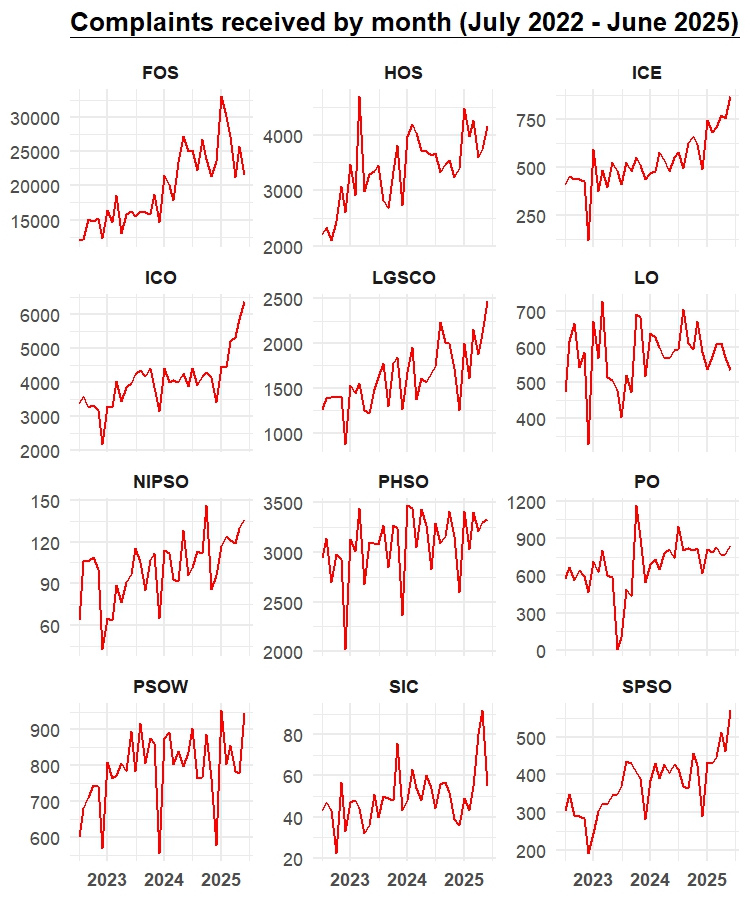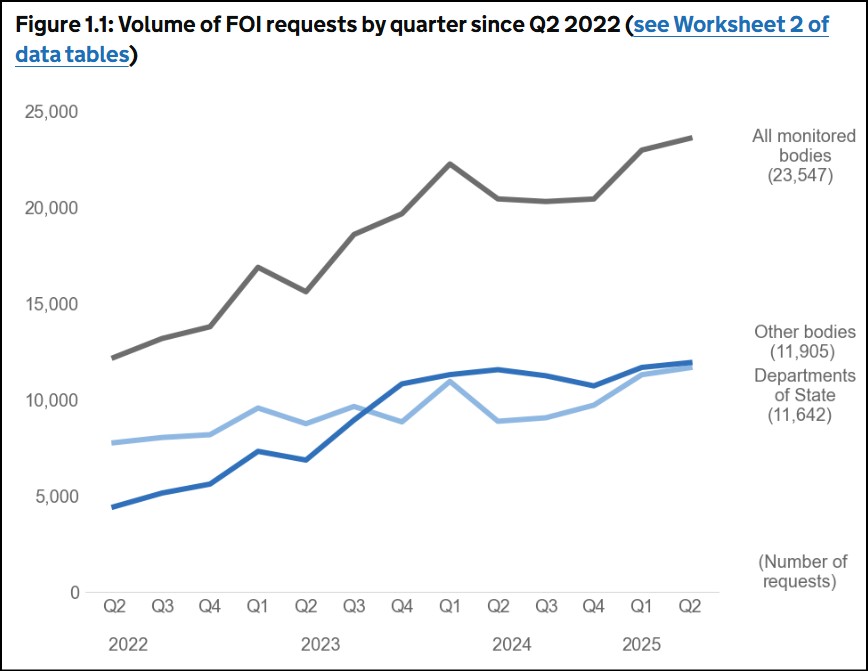Generative complaints
The UK’s major complaints services are receiving increasing numbers of cases to investigate, and the use of generative AI chatbots might be a cause.
How much is generative AI already helping people to assert their legal rights?
Direct research evidence is limited, but one indicator could be that (according to data I’ve obtained) the UK’s main complaints services have seen a recent upsurge in the numbers contacting them.
This mirrors the latest official freedom of information statistics which show a significant increase in the level of FOI requests to central government, another civic right.
AI chatbots may be lowering the barriers for ordinary citizens to pursue their grievances over how they’ve been treated by a public authority or commercial company.
On the other hand AI systems are not always used sensibly, while the greater volumes are increasing the demands on those at the receiving end.
I made FOI requests to establish the monthly figures for new cases over the past three years from a dozen authorities which investigate complaints from members of the public, such as the Financial Ombudsman Service and the Local Government and Social Care Ombudsman.
The charts below show the three-year pattern in the level of complaints they each received per month. (For further explanation see the notes at the end.) There are lots of ups and downs in each case, but a broad overall trend seems clear.

While none of these bodies seems to have conducted a formal analysis of the role of AI in the increases they are facing, anecdotally within the sector there is talk of the rapidly growing use of AI tools as being a major contributory factor.
The same is true within the FOI community, where some practitioners believe AI is boosting requests.
The next chart is taken from the latest government FOI statistics published last week, and shows what has happened to numbers of FOI requests to central government bodies over the past three years.

The evidence of AI playing a role in all this is circumstantial and anecdotal, but in my view it would be surprising if it wasn’t true. If you make something easier for people, and tell them how to do it, they will do it more often. A little experimentation confirms that popular chatbots will explain how best to raise complaints about failings in services and which organisation to direct them to, and conveniently offer to supply a draft or template for use.
While I’m not aware of any similar research in the UK, one American study last year reported that 18 percent of complaints to the US Consumer Financial Protection Bureau had evidence of text generated by an AI large language model.
Nevertheless there could also be other possible causes involved, such as perhaps a more general willingness to complain or more to complain about, as well as the specific factors that would significantly affect individual services.
It seems likely that younger and more tech-savvy citizens would be the earlier adopters. But the US experience suggests that possibly the use of AI in this way is also particularly helpful to people who are less proficient in English.
However the lazy or careless use of AI can hinder rather than help complainants. Last week the Information Commissioner’s Office rather sarcastically rebuked a requester for an internal review application which contained inaccurate statements. The ICO suggested the requester had relied on AI and added: “We advise that any AI generated material is verified before including it in your responses.” (This was spotted by the FOI trainer Tim Turner).
Collating these raw numbers leaves open the question of whether AI-assisted complaints are more or less likely to be effective.
But either way the increased number of complaints may present difficult challenges for these organisations, who will have to cope with the extra workload and prevent the build up of backlogs, possibly without the benefit of extra resources.
In due course AI tools may also help them process complaints more efficiently, in ways that some have already started to develop. However there are serious doubts about both accuracy and public acceptance for automated decision-making.
Notes
Financial Ombudsman Service (FOS) handles consumer complaints about financial services.
Housing Ombudsman Service (HOS) deals with residents’ complaints about social housing in England.
Independent Case Examiner (ICE) reviews certain complaints about state benefits and financial support.
Information Commissioner’s Office (ICO) covers data protection and freedom of information complaints. My chart amalgamates the figures for these two aspects of its work.
Local Government and Social Care Ombudsman (LGSCO) investigates complaints about councils and adult social care in England.
Legal Ombudsman (LO) handles complaints about legal services.
Northern Ireland Public Services Ombudsman (NIPSO) investigates complaints about public bodies in Northern Ireland.
Parliamentary and Health Service Ombudsman (PHSO) deals with complaints about UK government departments and the NHS in England.
Pensions Ombudsman (PO) covers pension schemes. The dramatic blip in the chart for mid-2023 is because for a period its online submission form was not available, followed by a rush of complaints when it returned.
Public Services Ombudsman for Wales (PSOW) handles complaints about Welsh public services.
Scottish Information Commissioner (SIC) covers Scottish freedom of information cases.
Scottish Public Services Ombudsman (SPSO) deals with complaints about Scottish public services. And on a side note, they responded to the FOI request which I submitted at 5pm one day by sending all the requested information at 1030am the next morning – so well done to them for the efficiency of their FOI operation.
My full dataset can be downloaded from here.
Generative complaints Read More »